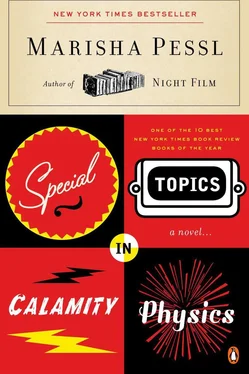I tried to calm myself. (“Emotion, especially excitement, is the enemy of dick work,” said Detective Lieutenant Peterson in Wooden Kimono [Lazim, 1980].)
L’Avventura , Michelangelo Antonioni’s lyrical black-and-white masterpiece of 1960, happened to be one of Dad’s favorite films and thus, over the years, I’d seen it no less than twelve times. (Dad had a soft spot for all things Italian, including curvy women with poofy hair and Marcello Mastroianni’s squints, shrugs, winks and smiles, which he tossed like overripe cherry tomatoes at women strolling Via Veneto. When Dad fell into a Mediterraneo Bourbon Mood, he’d even do bits of La Dolce Vita with pitch-perfect, seedy Italian flair: “ Tu sei la prima donna del primo giorno della creazione, sei la madre, la sorella, l’amante, l’amica, l’angelo, il diavolo, la terra, la casa …”)
The film’s simple plot unraveled as follows:
A wealthy socialite, Anna, goes on a yachting trip with her friends off the coast of Sicily. They go ashore to sunbathe on a deserted island. Anna wanders away and never returns. Anna’s fiancé, Sandro, and her best friend, Claudia, search the island and, subsequently, all of Italy, pursuing a variety of dead-end clues and embarking on a love affair of their own. At the film’s end, Anna’s disappearance remains as mysterious as it was the day she disappeared. Life continues — in this case, one of hollow desire and material excess — and Anna is all but forgotten.
Hannah had hoped I’d find this film. She’d hoped — no, she knew —I’d perceive the similarities between Anna’s unexplained tale and her own. (Even their names were virtually identical.) And she was confident I’d explain it to the others, not only that she’d planned this departure but that she wanted us to move on with our lives, with dancing barefoot with a wineglass, with shouting off of mountaintops (“Living Italian-Style,” as Dad was fond of saying, though being Swiss-born it was violently against nature for him to follow his own advice).
“ L’Avventura ,” Dad said, “has the sort of ellipsis ending most American audiences would rather undergo a root canal than be left with, not only because they loathe anything left to the imagination — we’re talking about a country that invented spandex — but also because they are a confident, self-assured nation. They know Family. They know Right from Wrong. They know God — many of them attest to daily chats with the man. And the idea that none of us can truly know anything at all — not the lives of our friends or family, not even ourselves — is a thought they’d rather be shot in the arm with their own semi-automatic rifle than face head on. Personally, I think there’s something terrific about not knowing, relinquishing man’s feeble attempt to control. When you throw up your hands, say, ‘Who knows?’ you can get on with the sheer gift of being alive, rather like the paparazzi , the puttane , the cognoscenti , the tappisti …” (Around here, I always tuned Dad out, because when he went on in Italian he was like a Hell’s Angel on a Harley; he loved to go fast and loud and for everyone to stop in the streets and stare at him.)
By now, it was after 6:00 P.M.. The sun was loosening its grip on the lawn and frilly black shadows had collapsed all over my bedroom floor like skinny widows killed with arsenic. I rolled off the bed, putting the folder and photo of punk-rocked Hannah in the top left desk drawer (where I also kept her Charles Manson paperback). I considered calling Milton, telling him everything, but then I heard the Volvo swerving down the driveway. Moments later, Dad was in the hall.
I found him by the front door, which he hadn’t closed because he was reading the front page of South Africa’s Cape Daily Press .
“You’ve got to be kidding me,” he muttered disgustedly, “poor disorganized fools — when will the madness — no, it won’t end, not until they educate — but it’s possible, crazier things have happened…” He glanced at me, a dour expression on his face, before returning to the article. “They’re slaughtering more rebels in the D.R.C., sweet, some five hundred—”
He looked at me again, startled. “What’s the matter? You look exhausted.” He frowned. “Are you still not sleeping? I went through quite a nasty period of insomnia myself, Harvard ’74—”
“I’m fine.”
He studied me, about to argue, then decided against it. “Well, never fear!” With a smile, he folded the newspaper. “Remember what we’re doing tomorrow or have you forgotten our bid for a day of repose? The great Lake Pennebaker!”
I had forgotten; Dad had been planning the day trip with all the excitement of Britain’s Captain Scott planning the world’s first expedition to the South Pole, hoping to beat Norway’s Captain Amundsen in the process. (In Dad’s case, he hoped to beat the retirees so he’d be first in line for a paddleboat and a picnic table in the shade.)
“A lake excursion,” he went on, kissing me on the cheek before picking up his briefcase and moving down the hall. “I must say I’m stirred by the idea, especially since we’ll be catching the tail end of the Pioneer Crafts Fair. I think you and I both require an afternoon in the sun, to take our minds off the flabby state of the world — though something tells me when I see the onslaught of RVs I’ll realize I’m not in Switzerland anymore.”
By Monday morning, I hadn’t slept a wink, having spent Saturday night and most of Sunday reading all 782 pages of The Evaporatists (Buddel, 1980), a biography about Boris and Bernice Pochechnik, husband-and-wife Hungarian grifters who, some thirty-nine times, staged their deaths and rebirths under aliases with the meticulous choreography and grace of the Bolshoi Ballet doing Swan Lake . I’d also reexamined disappearance statistics in the Almanac of American Strange Habits, Tics and Behaviors (1994 ed.), learning that while two out of every thirty-nine adults who absconded from their lives did so out of “sheer boredom” (99.2 percent of these were married, the ennui a result of a “lackluster spouse”), twenty-one out of the thirty-nine did so because of heat, the “iron-cleated sole of the law descending quickly upon them” they were criminals — petty crooks, con artists, embezzlers and felons. (Eleven out of thirty-nine did so due to drug addiction, three out of thirty-nine because they were “made” and fleeing the Italian or Russian mobs and two for unknown reasons.)
I’d also finished The History of Lynching in the American South (Kittson, 1966), and it was in that book I’d made my most exciting discovery: popular among Georgia slave owners and later reemerging during the second founding of the Ku Klux Klan in 1915, there was an effective hanging technique supposedly invented by Judge Charles Lynch himself, nicknamed “The Flying Demoiselle” due to the “quick soaring motion of the body as it is yanked into the air” (p. 213). “This method stayed popular due to its convenience,” the author Ed Kittson writes on p. 214. “A man with sufficient musculature could hang someone single-handedly, without the assistance of a mob. The noose and pulley is detailed but easy to learn with practice: a type of running bowline, tightening under strain, usually a Honda Knot, coupled with a Logger’s Hitch, around a strong tree limb. Once the victim is pulled three to six feet into the air depending on the slack, the Logger’s Hitch tightens and holds like a constrictor knot. Some thirty-nine lynchings transpired in this manner in 1919 alone.” The accompanying Visual Aid featured a lynching postcard—“common souvenirs in the Old South”—and written along the edge was “1917, Melville, Mississippi: ‘Our Flying Demoiselle / his body soars, his soul goes to hell’” (p. 215).
Читать дальше












